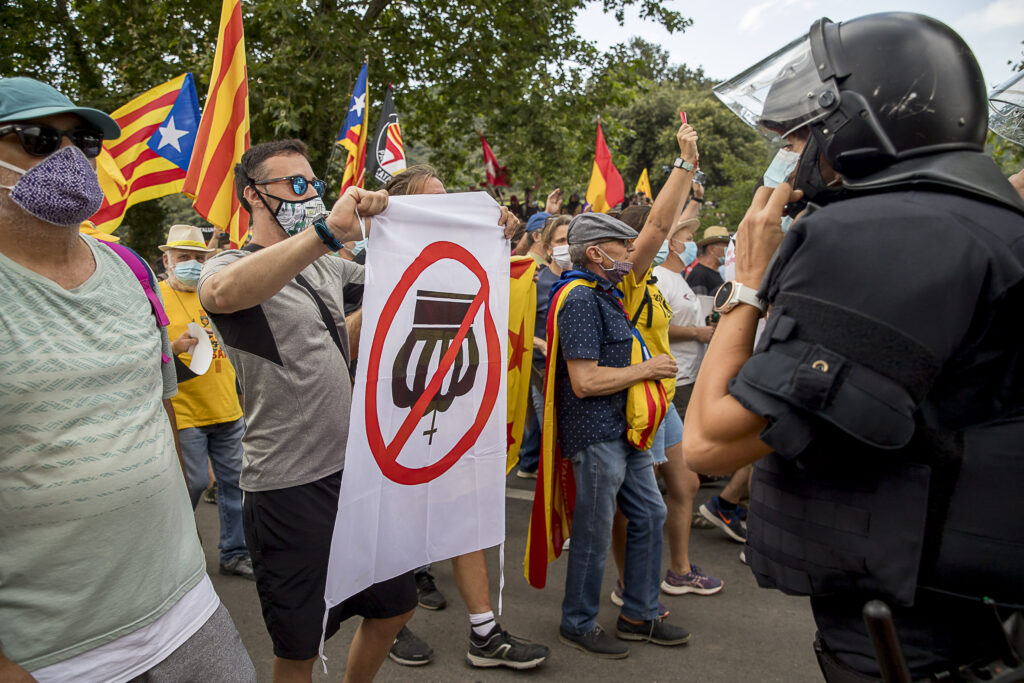09.10.2020 - 10:21
|
Actualització: 09.10.2020 - 12:21
The various demonstrations called ahead of Spain’s King Felipe’s visit to Barcelona on Friday October 9, 2020 are only one of the signs that show that the relationship between the Spanish Royal Family and Catalonia is not an easy one. There are obvious historical reasons that go back to 1714 behind this bad relationship.
Repeated parliamentary motions against the crown, surveys over time placing the institution bottom in popularity rankings, rallies every time that Felipe visits Catalonia, a popular rejection of his father’s alleged corruption scandals… The already unpopular institution descended into more discredit after the king’s role in the 2017 independence referendum crisis.
Score of 1.59 / 10
Ever since the Catalan government’s Center for Opinion Studies (CEO) began to ask about the monarchy in 2014, the institution has not received a score higher than 3 out of 10. Indeed, in the last poll published in July this year, the crown got 1.59 points, its worst score since 2014, coinciding with former king Juan Carlos’ alleged corruption case that resulted in him moving to the UAE.
In July only 15.4% of Catalans granted Felipe a score of 5 or above, while 78.3% failed him in a poll specifically on the role various institutions have played during the Covid-19 crisis. Asked about the king in general in April 2019, those polled gave him an average score of 1.82, and he only merited a pass from 19% of those taking part in the study. The last time CEO asked the question of monarchy or republic, in March 2020, 71.2% of those surveyed preferred the latter, with only 14.4% the former.
Role in 2017 referendum
The polls showed a decrease in the popularity of the king after the autumn 2017 independence push. Felipe gave a rare speech on October 3, 2017, two days after the referendum, where he blasted the Catalan government for having organized it without authorization from Spain – he made no mention of the 1,000 injuries caused by the Spanish police operation on October 1.
“It is the state powers’ duty to guarantee the constitutional order and the normal functioning of institutions, the enforcement of the rule of law and Catalonia’s self-rule, based on the constitution,” he said, a few weeks before the Spanish executive imposed direct rule. He accused the Catalan administration of being “irresponsible” and “putting economic stability at risk.”
“With their decisions, they systematically violated norms that were legally and rightfully passed, showing an unacceptable disloyalty towards the state powers,” he said in a speech seen by the pro-independence camp as a break of the political neutrality the constitution obliges him to have. Indeed, the parties for a Catalan republic have rejected meetings with the king or events where he was taking part on the grounds of his “lack of apology” for the 2017 speech.
Parliament calls for abolition of monarchy
Especially after 2017, the Catalan parliament has repeatedly approved motions against the role of the crown, including one in October 2018, when lawmakers demanded the abolition of Spain’s monarchy – a text that was subsequently blocked by Spain’s Constitutional Court. The same judges also blocked an investigation committee in the chamber on the alleged corruption scandal involving the ex-monarch Juan Carlos.
In July 2020, the chamber also called on the Catalan government not to invite Felipe to any event and asked the executive to request that Switzerland freeze accounts that Juan Carlos held in the Alpine country.
Protests on past visits
Hundreds or thousands of people have demonstrated every time that Felipe has set a foot in Catalonia over the past few years. On July 21, for example, Felipe visited the iconic Poblet monastery and hundreds of activists protested around a kilometer away, as they were barred from approaching the religious site that had been cordoned off by police.
On November 4, 2019, the monarch attended an awards ceremony in the Catalan capital and thousands of protesters rallied around the hotel where the event was held, blocking one of the main roads in and out of Barcelona for hours.
Likewise, hundreds joined a spontaneous rally on Sunday, February 24, 2019 as the head of the Royal Family arrived in Barcelona to inaugurate the Mobile World Congress the following day.


